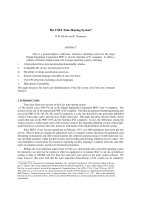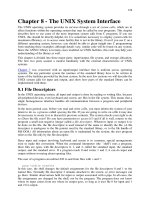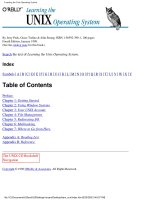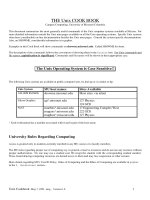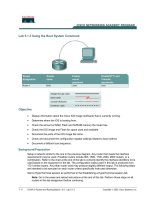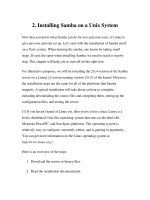The Unix system interface
Bạn đang xem bản rút gọn của tài liệu. Xem và tải ngay bản đầy đủ của tài liệu tại đây (329.36 KB, 16 trang )
138
Chapter 8 - The UNIX System Interface
The UNIX operating system provides its services through a set of system calls, which are in
effect functions within the operating system that may be called by user programs. This chapter
describes how to use some of the most important system calls from C programs. If you use
UNIX, this should be directly helpful, for it is sometimes necessary to employ system calls for
maximum efficiency, or to access some facility that is not in the library. Even if you use C on a
different operating system, however, you should be able to glean insight into C programming
from studying these examples; although details vary, similar code will be found on any system.
Since the ANSI C library is in many cases modeled on UNIX facilities, this code may help your
understanding of the library as well.
This chapter is divided into three major parts: input/output, file system, and storage allocation.
The first two parts assume a modest familiarity with the external characteristics of UNIX
systems.
Chapter 7 was concerned with an input/output interface that is uniform across operating
systems. On any particular system the routines of the standard library have to be written in
terms of the facilities provided by the host system. In the next few sections we will describe the
UNIX system calls for input and output, and show how parts of the standard library can be
implemented with them.
8.1 File Descriptors
In the UNIX operating system, all input and output is done by reading or writing files, because
all peripheral devices, even keyboard and screen, are files in the file system. This means that a
single homogeneous interface handles all communication between a program and peripheral
devices.
In the most general case, before you read and write a file, you must inform the system of your
intent to do so, a process called opening the file. If you are going to write on a file it may also
be necessary to create it or to discard its previous contents. The system checks your right to do
so (Does the file exist? Do you have permission to access it?) and if all is well, returns to the
program a small non-negative integer called a file descriptor. Whenever input or output is to
be done on the file, the file descriptor is used instead of the name to identify the file. (A file
descriptor is analogous to the file pointer used by the standard library, or to the file handle of
MS-DOS.) All information about an open file is maintained by the system; the user program
refers to the file only by the file descriptor.
Since input and output involving keyboard and screen is so common, special arrangements
exist to make this convenient. When the command interpreter (the ``shell'') runs a program,
three files are open, with file descriptors 0, 1, and 2, called the standard input, the standard
output, and the standard error. If a program reads 0 and writes 1 and 2, it can do input and
output without worrying about opening files.
The user of a program can redirect I/O to and from files with < and >:
prog <infile >outfile
In this case, the shell changes the default assignments for the file descriptors 0 and 1 to the
named files. Normally file descriptor 2 remains attached to the screen, so error messages can
go there. Similar observations hold for input or output associated with a pipe. In all cases, the
file assignments are changed by the shell, not by the program. The program does not know
where its input comes from nor where its output goes, so long as it uses file 0 for input and 1
and 2 for output.
139
8.2 Low Level I/O - Read and Write
Input and output uses the read and write system calls, which are accessed from C programs
through two functions called read and write. For both, the first argument is a file descriptor.
The second argument is a character array in your program where the data is to go to or to
come from. The third argument is the number is the number of bytes to be transferred.
int n_read = read(int fd, char *buf, int n);
int n_written = write(int fd, char *buf, int n);
Each call returns a count of the number of bytes transferred. On reading, the number of bytes
returned may be less than the number requested. A return value of zero bytes implies end of
file, and -1 indicates an error of some sort. For writing, the return value is the number of bytes
written; an error has occurred if this isn't equal to the number requested.
Any number of bytes can be read or written in one call. The most common values are 1, which
means one character at a time (``unbuffered''), and a number like 1024 or 4096 that
corresponds to a physical block size on a peripheral device. Larger sizes will be more efficient
because fewer system calls will be made.
Putting these facts together, we can write a simple program to copy its input to its output, the
equivalent of the file copying program written for Chapter 1. This program will copy anything
to anything, since the input and output can be redirected to any file or device.
#include "syscalls.h"
main() /* copy input to output */
{
char buf[BUFSIZ];
int n;
while ((n = read(0, buf, BUFSIZ)) > 0)
write(1, buf, n);
return 0;
}
We have collected function prototypes for the system calls into a file called syscalls.h so we
can include it in the programs of this chapter. This name is not standard, however.
The parameter BUFSIZ is also defined in syscalls.h; its value is a good size for the local
system. If the file size is not a multiple of BUFSIZ, some read will return a smaller number of
bytes to be written by write; the next call to read after that will return zero.
It is instructive to see how read and write can be used to construct higher-level routines like
getchar, putchar, etc. For example, here is a version of getchar that does unbuffered input,
by reading the standard input one character at a time.
#include "syscalls.h"
/* getchar: unbuffered single character input */
int getchar(void)
{
char c;
return (read(0, &c, 1) == 1) ? (unsigned char) c : EOF;
}
c must be a char, because read needs a character pointer. Casting c to unsigned char in the
return statement eliminates any problem of sign extension.
The second version of getchar does input in big chunks, and hands out the characters one at a
time.
140
#include "syscalls.h"
/* getchar: simple buffered version */
int getchar(void)
{
static char buf[BUFSIZ];
static char *bufp = buf;
static int n = 0;
if (n == 0) { /* buffer is empty */
n = read(0, buf, sizeof buf);
bufp = buf;
}
return (--n >= 0) ? (unsigned char) *bufp++ : EOF;
}
If these versions of getchar were to be compiled with <stdio.h> included, it would be
necessary to #undef the name getchar in case it is implemented as a macro.
8.3 Open, Creat, Close, Unlink
Other than the default standard input, output and error, you must explicitly open files in order
to read or write them. There are two system calls for this, open and creat [sic].
open is rather like the fopen discussed in Chapter 7, except that instead of returning a file
pointer, it returns a file descriptor, which is just an int. open returns -1 if any error occurs.
#include <fcntl.h>
int fd;
int open(char *name, int flags, int perms);
fd = open(name, flags, perms);
As with fopen, the name argument is a character string containing the filename. The second
argument, flags, is an int that specifies how the file is to be opened; the main values are
O_RDONLY
open for reading only
O_WRONLY
open for writing only
O_RDWR
open for both reading and writing
These constants are defined in <fcntl.h> on System V UNIX systems, and in <sys/file.h>
on Berkeley (BSD) versions.
To open an existing file for reading,
fd = open(name, O_RDONLY,0);
The perms argument is always zero for the uses of open that we will discuss.
It is an error to try to open a file that does not exist. The system call creat is provided to
create new files, or to re-write old ones.
int creat(char *name, int perms);
fd = creat(name, perms);
returns a file descriptor if it was able to create the file, and -1 if not. If the file already exists,
creat will truncate it to zero length, thereby discarding its previous contents; it is not an error
to creat a file that already exists.
If the file does not already exist, creat creates it with the permissions specified by the perms
argument. In the UNIX file system, there are nine bits of permission information associated
with a file that control read, write and execute access for the owner of the file, for the owner's
group, and for all others. Thus a three-digit octal number is convenient for specifying the
141
permissions. For example, 0775 specifies read, write and execute permission for the owner,
and read and execute permission for the group and everyone else.
To illustrate, here is a simplified version of the UNIX program cp, which copies one file to
another. Our version copies only one file, it does not permit the second argument to be a
directory, and it invents permissions instead of copying them.
#include <stdio.h>
#include <fcntl.h>
#include "syscalls.h"
#define PERMS 0666 /* RW for owner, group, others */
void error(char *, ...);
/* cp: copy f1 to f2 */
main(int argc, char *argv[])
{
int f1, f2, n;
char buf[BUFSIZ];
if (argc != 3)
error("Usage: cp from to");
if ((f1 = open(argv[1], O_RDONLY, 0)) == -1)
error("cp: can't open %s", argv[1]);
if ((f2 = creat(argv[2], PERMS)) == -1)
error("cp: can't create %s, mode %03o",
argv[2], PERMS);
while ((n = read(f1, buf, BUFSIZ)) > 0)
if (write(f2, buf, n) != n)
error("cp: write error on file %s", argv[2]);
return 0;
}
This program creates the output file with fixed permissions of 0666. With the stat system call,
described in Section 8.6, we can determine the mode of an existing file and thus give the same
mode to the copy.
Notice that the function error is called with variable argument lists much like printf. The
implementation of error illustrates how to use another member of the printf family. The
standard library function vprintf is like printf except that the variable argument list is
replaced by a single argument that has been initialized by calling the va_start macro.
Similarly, vfprintf and vsprintf match fprintf and sprintf.
#include <stdio.h>
#include <stdarg.h>
/* error: print an error message and die */
void error(char *fmt, ...)
{
va_list args;
va_start(args, fmt);
fprintf(stderr, "error: ");
vprintf(stderr, fmt, args);
fprintf(stderr, "\n");
va_end(args);
exit(1);
}
There is a limit (often about 20) on the number of files that a program may open
simultaneously. Accordingly, any program that intends to process many files must be prepared
to re-use file descriptors. The function close(int fd) breaks the connection between a file
descriptor and an open file, and frees the file descriptor for use with some other file; it
142
corresponds to fclose in the standard library except that there is no buffer to flush.
Termination of a program via exit or return from the main program closes all open files.
The function unlink(char *name) removes the file name from the file system. It corresponds
to the standard library function remove.
Exercise 8-1. Rewrite the program cat from Chapter 7 using read, write, open, and close
instead of their standard library equivalents. Perform experiments to determine the relative
speeds of the two versions.
8.4 Random Access - Lseek
Input and output are normally sequential: each read or write takes place at a position in the
file right after the previous one. When necessary, however, a file can be read or written in any
arbitrary order. The system call lseek provides a way to move around in a file without reading
or writing any data:
long lseek(int fd, long offset, int origin);
sets the current position in the file whose descriptor is fd to offset, which is taken relative to
the location specified by origin. Subsequent reading or writing will begin at that position.
origin can be 0, 1, or 2 to specify that offset is to be measured from the beginning, from the
current position, or from the end of the file respectively. For example, to append to a file (the
redirection >> in the UNIX shell, or "a" for fopen), seek to the end before writing:
lseek(fd, 0L, 2);
To get back to the beginning (``rewind''),
lseek(fd, 0L, 0);
Notice the 0L argument; it could also be written as (long) 0 or just as 0 if lseek is properly
declared.
With lseek, it is possible to treat files more or less like arrays, at the price of slower access.
For example, the following function reads any number of bytes from any arbitrary place in a
file. It returns the number read, or -1 on error.
#include "syscalls.h"
/*get: read n bytes from position pos */
int get(int fd, long pos, char *buf, int n)
{
if (lseek(fd, pos, 0) >= 0) /* get to pos */
return read(fd, buf, n);
else
return -1;
}
The return value from lseek is a long that gives the new position in the file, or -1 if an error
occurs. The standard library function fseek is similar to lseek except that the first argument
is a FILE * and the return is non-zero if an error occurred.
8.5 Example - An implementation of Fopen and Getc
Let us illustrate how some of these pieces fit together by showing an implementation of the
standard library routines fopen and getc.
Recall that files in the standard library are described by file pointers rather than file descriptors.
A file pointer is a pointer to a structure that contains several pieces of information about the
file: a pointer to a buffer, so the file can be read in large chunks; a count of the number of
characters left in the buffer; a pointer to the next character position in the buffer; the file
descriptor; and flags describing read/write mode, error status, etc.
143
The data structure that describes a file is contained in <stdio.h>, which must be included (by
#include) in any source file that uses routines from the standard input/output library. It is also
included by functions in that library. In the following excerpt from a typical <stdio.h>, names
that are intended for use only by functions of the library begin with an underscore so they are
less likely to collide with names in a user's program. This convention is used by all standard
library routines.
#define NULL 0
#define EOF (-1)
#define BUFSIZ 1024
#define OPEN_MAX 20 /* max #files open at once */
typedef struct _iobuf {
int cnt; /* characters left */
char *ptr; /* next character position */
char *base; /* location of buffer */
int flag; /* mode of file access */
int fd; /* file descriptor */
} FILE;
extern FILE _iob[OPEN_MAX];
#define stdin (&_iob[0])
#define stdout (&_iob[1])
#define stderr (&_iob[2])
enum _flags {
_READ = 01, /* file open for reading */
_WRITE = 02, /* file open for writing */
_UNBUF = 04, /* file is unbuffered */
_EOF = 010, /* EOF has occurred on this file */
_ERR = 020 /* error occurred on this file */
};
int _fillbuf(FILE *);
int _flushbuf(int, FILE *);
#define feof(p) ((p)->flag & _EOF) != 0)
#define ferror(p) ((p)->flag & _ERR) != 0)
#define fileno(p) ((p)->fd)
#define getc(p) (--(p)->cnt >= 0 \
? (unsigned char) *(p)->ptr++ : _fillbuf(p))
#define putc(x,p) (--(p)->cnt >= 0 \
? *(p)->ptr++ = (x) : _flushbuf((x),p))
#define getchar() getc(stdin)
#define putcher(x) putc((x), stdout)
The getc macro normally decrements the count, advances the pointer, and returns the
character. (Recall that a long #define is continued with a backslash.) If the count goes
negative, however, getc calls the function _fillbuf to replenish the buffer, re-initialize the
structure contents, and return a character. The characters are returned unsigned, which
ensures that all characters will be positive.
Although we will not discuss any details, we have included the definition of putc to show that
it operates in much the same way as getc, calling a function _flushbuf when its buffer is full.
We have also included macros for accessing the error and end-of-file status and the file
descriptor.
The function fopen can now be written. Most of fopen is concerned with getting the file
opened and positioned at the right place, and setting the flag bits to indicate the proper state.
fopen does not allocate any buffer space; this is done by _fillbuf when the file is first read.
